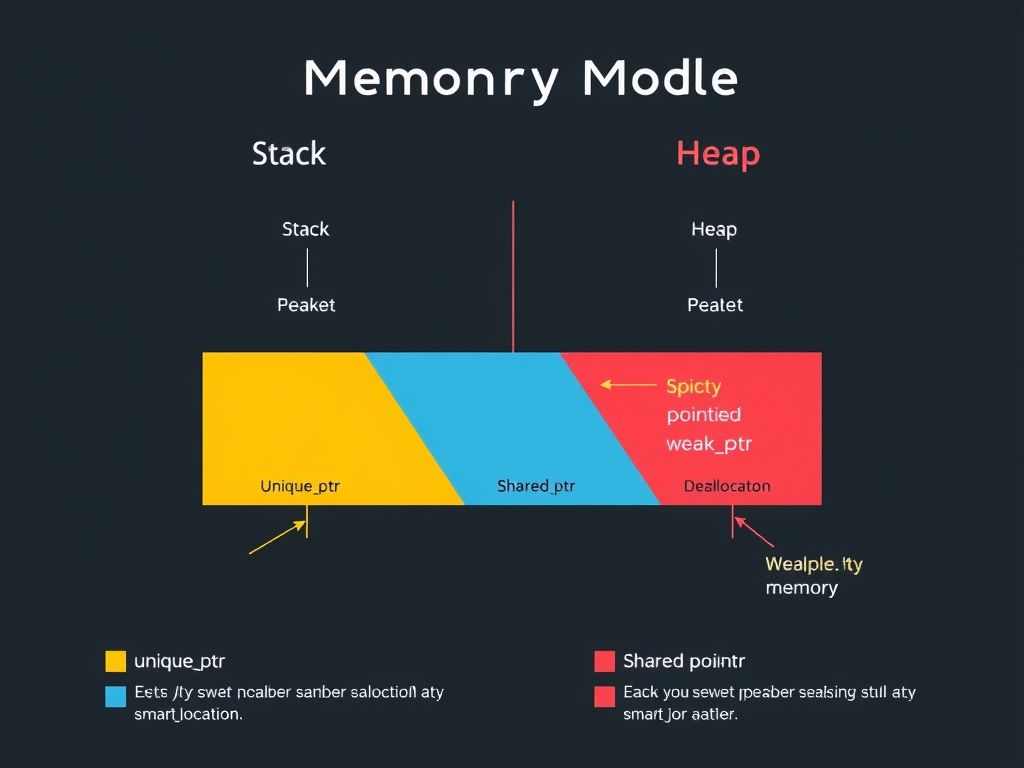C++ programming often involves intricate memory management. Understanding and mastering these techniques is crucial for writing efficient and robust code. This guide provides practical tips and strategies to optimize memory usage in C++ applications, leading to faster execution and reduced resource consumption.
Chapter Title: Understanding C++ Memory Allocation
In C++, efficient memory management is paramount for writing robust and high-performance applications. Neglecting memory management can lead to memory leaks, segmentation faults, and overall program instability. To achieve *code nhanh* (fast code) and reliable software, a solid understanding of memory allocation methods is essential. This chapter will delve into the two primary memory allocation techniques in C++: stack-based and heap-based allocation, exploring their characteristics and implications for program performance.
Stack-Based Allocation
Stack-based allocation is an automatic memory management approach where memory is allocated and deallocated in a Last-In, First-Out (LIFO) manner. This memory region, known as the “stack,” is typically used for storing local variables, function parameters, and return addresses. When a function is called, a new stack frame is created, pushing the necessary data onto the stack. Upon function completion, the stack frame is automatically popped, releasing the allocated memory.
Here are some key characteristics of stack-based allocation:
- Automatic Management: The compiler automatically manages memory allocation and deallocation, relieving the programmer from manual memory management tasks.
- Fast Allocation and Deallocation: Stack operations are typically very fast because they involve simply adjusting the stack pointer.
- Limited Size: The stack size is usually limited and predefined, which can lead to stack overflow errors if excessive memory is allocated on the stack.
- Local Scope: Variables allocated on the stack have local scope, meaning they are only accessible within the function or block in which they are defined.
For instance, consider the following C++ code snippet:
“`c++
void myFunction() {
int x = 10; // x is allocated on the stack
// …
} // x is automatically deallocated when myFunction returns
“`
In this example, the integer variable `x` is allocated on the stack when `myFunction` is called, and it is automatically deallocated when the function returns. This automatic nature simplifies memory management and reduces the risk of memory leaks.
Heap-Based Allocation
Heap-based allocation, on the other hand, involves dynamic memory allocation using operators like `new` and `delete`. The “heap” is a larger memory region that is available for dynamic allocation during program execution. Unlike the stack, memory allocated on the heap must be explicitly managed by the programmer.
Here are some key characteristics of heap-based allocation:
- Manual Management: The programmer is responsible for allocating and deallocating memory using `new` and `delete` (or `new[]` and `delete[]` for arrays).
- Slower Allocation and Deallocation: Heap operations are generally slower than stack operations due to the overhead of searching for available memory blocks and maintaining memory allocation metadata.
- Larger Size: The heap typically has a much larger size compared to the stack, allowing for the allocation of larger data structures and objects.
- Global Scope: Memory allocated on the heap can have a longer lifespan and can be accessed from different parts of the program, provided that the appropriate pointers are maintained.
Here’s an example of heap-based allocation:
“`c++
int* ptr = new int; // Allocate an integer on the heap
*ptr = 20;
// …
delete ptr; // Deallocate the memory when it’s no longer needed
ptr = nullptr; // Good practice to avoid dangling pointers
“`
In this example, an integer is dynamically allocated on the heap using `new int`. The programmer is then responsible for deallocating the memory using `delete ptr` when it is no longer needed. Failing to deallocate memory allocated on the heap results in a memory leak. *Quản lý bộ nhớ* (memory management) is critical here.
Implications for Program Performance
The choice between stack-based and heap-based allocation significantly impacts program performance. Stack allocation is generally faster and simpler due to its automatic nature. However, it is limited by the stack size and the scope of local variables. Heap allocation provides greater flexibility and allows for dynamic memory management, but it comes with the overhead of manual memory management and the risk of memory leaks. For *Tip lập trình C++* (C++ programming tips), understanding these trade-offs is essential.
Understanding the differences between stack and heap allocation is fundamental to writing efficient C++ code. Choosing the appropriate allocation method depends on the specific requirements of the application. For small, short-lived variables, stack allocation is often the preferred choice. For larger data structures or objects that need to persist beyond the scope of a function, heap allocation is necessary.
The next chapter, “Managing Memory with Smart Pointers,” will delve into techniques for simplifying heap-based memory management and preventing memory leaks through the use of smart pointers. It will detail the use of smart pointers (unique_ptr, shared_ptr, weak_ptr) to manage dynamically allocated memory in C++. It will explain how smart pointers automatically handle memory deallocation, preventing memory leaks and improving code safety, and include examples of how to use them in different scenarios.
Following our discussion on “Understanding C++ Memory Allocation” in the previous chapter, where we highlighted the differences between stack-based and heap-based allocation and their impact on program performance, we now delve into a critical aspect of writing efficient C++ code: managing dynamically allocated memory with smart pointers. As we learned, manual memory management in C++ can be error-prone, leading to memory leaks and other issues that degrade performance. This chapter focuses on how smart pointers automate memory deallocation, preventing these problems and significantly improving code safety – a crucial **Tip lập trình C++**.
Managing Memory with Smart Pointers
Smart pointers are classes that behave like regular pointers but provide automatic memory management. They ensure that dynamically allocated memory is automatically deallocated when it’s no longer needed, preventing memory leaks. C++ offers three main types of smart pointers: `unique_ptr`, `shared_ptr`, and `weak_ptr`.
`unique_ptr`
The `unique_ptr` provides exclusive ownership of the managed object. Only one `unique_ptr` can point to a given object at any time. When the `unique_ptr` goes out of scope, the object it points to is automatically deleted. This makes `unique_ptr` ideal for scenarios where you want to ensure that an object is owned by a single entity and automatically cleaned up when that entity is done with it.
Example:
“`cpp
#include
#include
int main() {
std::unique_ptr
std::cout << *ptr << std::endl; // Access the value
// Memory is automatically freed when ptr goes out of scope
return 0;
}
```
In this example, `ptr` owns the dynamically allocated integer. When `ptr` goes out of scope at the end of `main`, the integer is automatically deleted, preventing a memory leak. `unique_ptr` also prevents copying, enforcing its exclusive ownership. To transfer ownership, you use `std::move`. This is important for **quản lý bộ nhớ**.
`shared_ptr`
The `shared_ptr` allows multiple pointers to share ownership of the same object. It uses a reference count to keep track of how many `shared_ptr` instances are pointing to the object. When the reference count drops to zero, meaning no `shared_ptr` instances are pointing to the object, the memory is automatically deallocated. This is useful when multiple parts of your code need to access and manage the same object.
Example:
“`cpp
#include
#include
int main() {
std::shared_ptr
std::shared_ptr
std::cout << "ptr1 count: " << ptr1.use_count() << std::endl; // Output: 2 std::cout << "ptr2 count: " << ptr2.use_count() << std::endl; // Output: 2 ptr1.reset(); // ptr1 releases ownership std::cout << "ptr2 count: " << ptr2.use_count() << std::endl; // Output: 1 // Memory is automatically freed when ptr2 goes out of scope return 0; } ``` In this example, `ptr1` and `ptr2` both point to the same dynamically allocated integer. When `ptr1` is reset, it releases its ownership, but the memory is not deallocated because `ptr2` still points to it. When `ptr2` goes out of scope, the reference count drops to zero, and the memory is automatically freed. Using `std::make_shared` is generally recommended for efficiency, as it allocates the control block and the object in a single allocation. This contributes to creating **code nhanh**. `weak_ptr`
The `weak_ptr` provides a non-owning reference to an object managed by a `shared_ptr`. It does not contribute to the reference count. A `weak_ptr` can be used to observe an object without preventing its deallocation. You can check if the object still exists using the `expired()` method, and you can obtain a `shared_ptr` to the object (if it still exists) using the `lock()` method. This is particularly useful for breaking circular dependencies between `shared_ptr` instances.
Example:
“`cpp
#include
#include
int main() {
std::shared_ptr
std::weak_ptr
if (weakPtr.expired()) {
std::cout << "Object is no longer valid." << std::endl;
} else {
std::shared_ptr
std::cout << *lockedPtr << std::endl; // Access the value
}
sharedPtr.reset(); // sharedPtr releases ownership
if (weakPtr.expired()) {
std::cout << "Object is no longer valid." << std::endl; // This will be printed
}
return 0;
}
```
In this example, `weakPtr` observes the object managed by `sharedPtr`. When `sharedPtr` is reset, the object is deallocated, and `weakPtr.expired()` returns `true`.
By using smart pointers effectively, you can significantly reduce the risk of memory leaks and improve the overall safety and reliability of your C++ code. Proper **quản lý bộ nhớ** is essential for robust applications.
In the next chapter, we will explore "Code Optimization for Faster Memory Access," delving into strategies for minimizing memory usage and improving performance through techniques like minimizing unnecessary allocations and optimizing data structures.
Chapter Title: Code Optimization for Faster Memory Access
Following our discussion on managing memory with smart pointers, specifically `unique_ptr`, `shared_ptr`, and `weak_ptr`, which automatically handle memory deallocation and prevent memory leaks, let’s delve into strategies for writing efficient C++ code that minimizes memory usage and improves performance. This is crucial for achieving *code nhanh*, or fast code, a common goal in C++ development. Efficient memory management is a cornerstone of writing high-performance C++ applications.
One of the primary techniques is **minimizing unnecessary allocations**. Dynamic memory allocation (using `new` and `delete`, even indirectly through smart pointers) can be expensive. Each allocation requires the system to find a suitable block of memory, which takes time. Therefore, reducing the number of allocations can significantly improve performance.
Here are some strategies to achieve this:
- Use Stack Allocation When Possible: Prefer allocating objects on the stack whenever their lifetime is limited to the scope of a function or block. Stack allocation is much faster than heap allocation.
- Object Pooling: If you frequently need to create and destroy objects of the same type, consider using an object pool. An object pool pre-allocates a set of objects, and instead of creating new objects, you reuse objects from the pool. This avoids the overhead of repeated allocation and deallocation.
- Avoid Excessive Copying: Copying large objects can be expensive, both in terms of memory usage and CPU time. Use references or pointers to pass objects around whenever possible. If you must copy, consider using move semantics (introduced in C++11) to transfer ownership of resources instead of creating a deep copy.
Another important technique is **using pre-allocation strategies**. If you know the maximum size of a data structure in advance, pre-allocate the required memory. This avoids the need for dynamic resizing, which can be slow and lead to memory fragmentation.
For example, when using `std::vector`, you can use the `reserve()` method to pre-allocate memory for a specific number of elements. This is particularly useful when you know you will be adding a large number of elements to the vector.
“`cpp
std::vector
myVector.reserve(1000); // Pre-allocate memory for 1000 integers
for (int i = 0; i < 1000; ++i) {
myVector.push_back(i);
}
```
Optimizing data structures for efficient memory access is also crucial. The choice of data structure can have a significant impact on performance. For example, using a `std::vector` for sequential access is generally more efficient than using a `std::list`, because `std::vector` stores elements in contiguous memory locations, which allows for faster access. Understanding the characteristics of different data structures and choosing the right one for your specific needs is an important *tip lập trình C++*.
Furthermore, consider the memory layout of your data structures. Aligning data members on appropriate boundaries can improve memory access performance. Compilers often do this automatically, but you can sometimes improve performance by manually specifying alignment using attributes or pragmas.
Effective *quản lý bộ nhớ*, or memory management, extends beyond just preventing leaks. It’s about writing code that uses memory efficiently and minimizes overhead. Techniques such as minimizing unnecessary allocations, using pre-allocation, and optimizing data structures are all vital components of writing high-performance C++ code. By carefully considering these factors, you can significantly improve the speed and efficiency of your applications. Remember that profiling your code to identify memory-related bottlenecks is a crucial step in optimization. Tools like profilers can help pinpoint areas where memory usage is excessive or inefficient, allowing you to focus your optimization efforts where they will have the greatest impact.
Conclusions
Effective memory management is vital for writing efficient C++ code. By understanding memory allocation methods, leveraging smart pointers, and optimizing code for memory access, developers can significantly improve application performance and reliability. Start implementing these techniques today!











